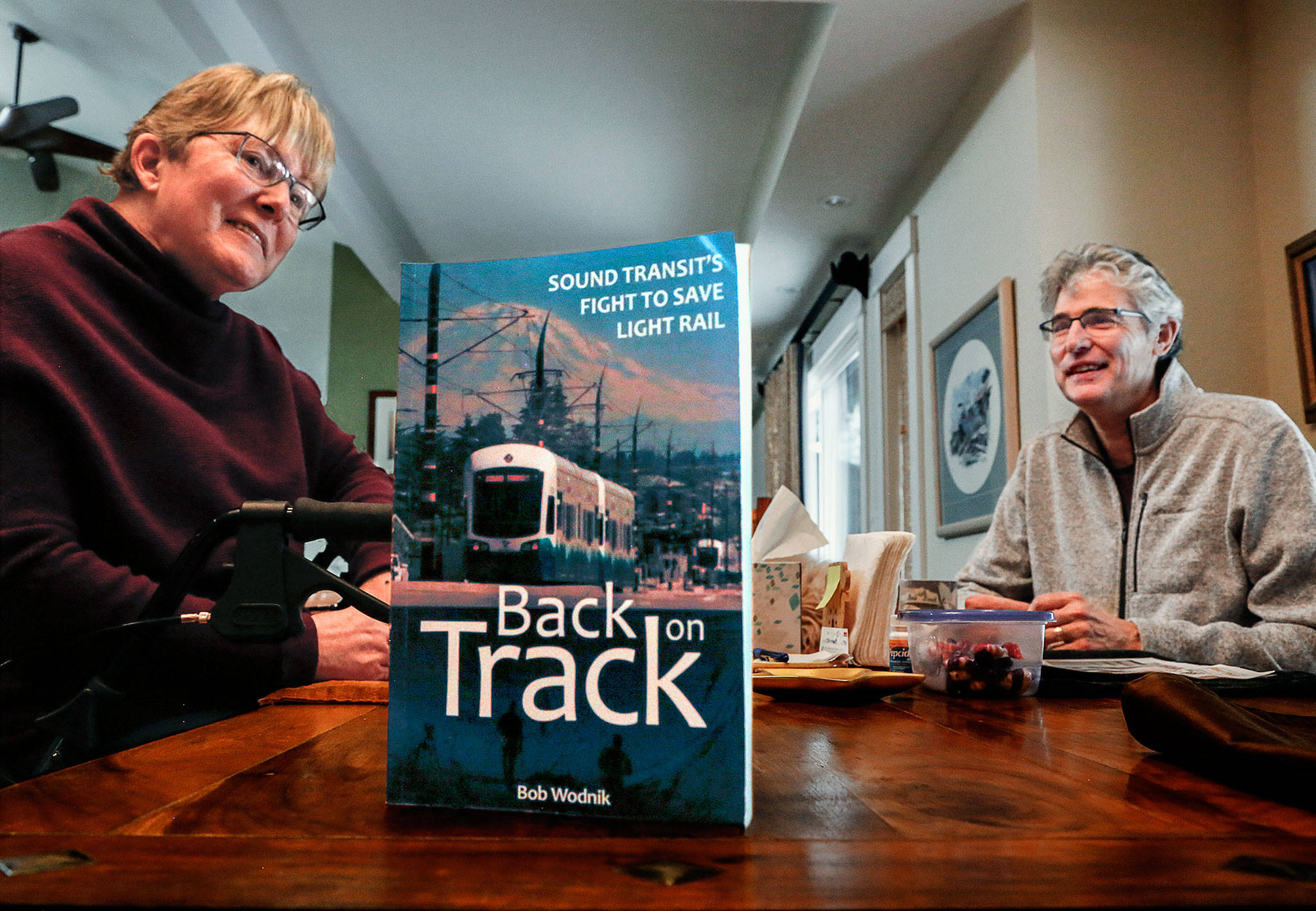Ride it. And read it.
Do both — take a trip on Link light rail and dive into former Herald writer Bob Wodnik’s new book, “Back on Track: Sound Transit’s Fight to Save Light Rail.” Whatever your politics or views on mass transit, you’ll get a clearer picture of issues that have stirred debate and rallied voters in this region since the late 1960s.
“I felt so committed to the project,” said Joni Earl, 66, who is back in Snohomish County after her tenure, from 2001 to 2016, as Sound Transit’s CEO.
Earl is at the center of Wodnik’s Sound Transit history. Published by WSU Press, the book zeroes in on a make-or-break year, 2001, when the agency’s woes could have been its demise. The book credits Earl for her no-nonsense rescue of Sound Transit, after a billion-dollar shortfall in initial light rail budgeting became apparent.
Wodnik, 65, brought two decades of experience inside Sound Transit to his book project. A Herald reporter from 1987 to 1999 — he wrote the Street Smarts column for a decade — Wodnik then spent 19 years with the transit agency. An Everett resident, he was Sound Transit’s senior communications specialist when he retired in 2018.
A Bremerton native, Earl became the face of Sound Transit when critics in government, the public and media questioned whether the agency would or should survive. The survival question has been answered. The book’s celebratory introduction puts readers with enthusiastic crowds on the first day of light rail service, July 18, 2009.
Link light rail trains, which now run from the University of Washington to Sea-Tac Airport and Angle Lake, are often packed. And yes, I’ve experienced the ride — to Husky Stadium and Seahawks games.
Starting at Sound Transit in 2000 as its chief operating officer, Earl worked doggedly to discover the true costs of light rail, after years of overly optimistic projections. Two months into her job, new numbers were released to the agency’s board: “It would take three years longer and cost more than a billion dollars more to complete Sound Transit’s first light rail line,” Wodnik wrote.
“The board felt they had been sandbagged,” Wodnik said in a recent interview. At the time, the Sound Transit board was headed by Dave Earling, who was later Edmonds mayor.
Earl, an accountant, worked to win over those who doubted her because she lacked transit experience. A former Mill Creek city manager, Earl was Snohomish County’s deputy executive when Bob Drewel was county executive.
The book offers an insider’s view of how, under Earl’s leadership, Sound Transit eventually secured a $500 million federal grant that at times was in doubt. The agency got past a lawsuit over its authority to change routes. There were onerous demands from communities the light rail line would affect, from Tukwila and the Rainier Valley to the UW.
Sound Transit was also the target of highly vocal critics who pushed for other ways of moving people around — for example, free buses or an expanded Monorail system.
From its headquarters in Seattle’s historic Union Station building, Sound Transit is still fighting battles, but now under the leadership of CEO Peter Rogoff. State lawmakers now face fallout from voters’ passage of Initiative 976, which called for $30 car tabs, and potential losses to voter-approved Sound Transit 3 projects.
Today, Earl and her husband, Charlie Earl, are back in Mill Creek after living in Tacoma. Charlie Earl was once president of Everett Community College and previously general manager of the Snohomish PUD.
With professional challenges behind her, Joni Earl still struggles with the effects of a 2014 accident that affects her mobility. In Tacoma, she suffered a fall after being hit by a bicycle rider. Her badly broken wrist meant surgery, but that was followed by what she said Monday was “a brain bleed,” a subdural hematoma.
She was hospitalized for five months. More than five years later, she needs a wheelchair or a walker. After a medical leave and working at home, she officially retired in 2016. Earl shared a sweet memory of taking her two granddaughters on light rail, and having them call it “Grandma’s train.”
The story isn’t over.
“It’s coming to Lynnwood. The original plan was to build out a spine, and the spine is going to get built,” Wodnik said. His earlier book, “Captured Honor,” is the true tale of a local man’s suffering in a Japanese prison camp during World War II.
Why didn’t voters give light rail the go-ahead by the early 1970s? Wodnik reminds readers that the era coincided with the Boeing bust, and thousands of layoffs.
It is an expensive dream. Joni Earl remains a true believer, and said other places had their fights over light rail.
“They fought it in San Francisco, they fought it in LA,” she said. “Once it’s there, people love it.”
Julie Muhlstein: 425-339-3460; jmuhlstein@heraldnet.com.
Town Hall program
Author Bob Wodnik and former Sound Transit CEO Joni Earl will present a talk about Wodnik’s new book, “Back on Track: Sound Transit’s Fight to Save Light Rail,” at 7:30 p.m. Feb. 26, in the Forum at Town Hall Seattle, 1119 Eighth Ave., Seattle. Cost is $5.
Information: townhallseattle.org/event/bob-wodnik-and-joni-earl
Learn about Wodnik’s book at: wsupress.wsu.edu/product/back-on-track
Talk to us
> Give us your news tips.
> Send us a letter to the editor.
> More Herald contact information.

























